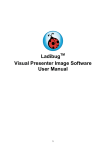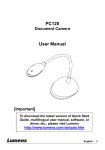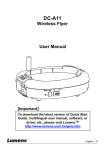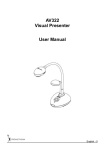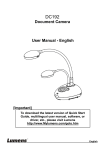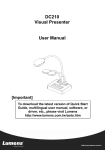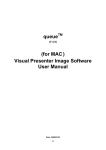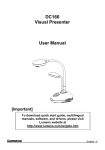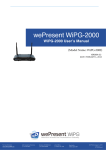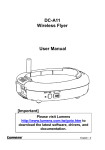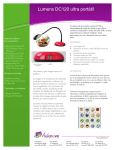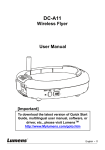Download DC120 Visual Presenter User Manual
Transcript
DC120 Visual Presenter User Manual [Important] Please visit Lumens http://www.lumens.com.tw/goto.htm to download the latest software, drivers, and documentation English - 0 Table of contents Copyright Information ..................................................................................... 3 Chapter 1 Safety Instructions ...................................................................... 4 Safety Precautions ........................................................................ 5 FCC Warning ................................................................................. 5 EN55022 (CE Radiation) Warning ................................................ 5 Revisions .......................................................................................................... 6 Chapter 2 Package Contents ....................................................................... 7 Chapter 3 Product Overview ........................................................................ 8 3.1 Relative Operation Position ........................................................... 9 3.2 Recommend distance .................................................................... 9 3.3 Incorrect Use ............................................................................... 10 Chapter 4 Installation and Connections ................................................... 11 4.1 System Diagram .......................................................................... 11 4.2 Connecting to a computer ........................................................... 11 4.3 Connecting to an Interactive Whiteboard (IWB) .......................... 11 4.4 Mounting the DC120 ................................................................... 12 4.5 Installing application software ..................................................... 12 Chapter 5 Start Using .................................................................................. 18 Chapter 6 Function Menu ........................................................................... 19 6.1 Main Function Menu .................................................................... 19 6.2 Annotation Tools .......................................................................... 20 Chapter 7 Descriptions of Major Functions ................................................... 21 7.1 I would like to display a live image .............................................. 21 7.2 I would like to optimize the image ............................................... 21 7.3 I would like to zoom in/zoom out ................................................. 21 7.4 I would like to use the auto focus ................................................ 21 7.5 I would like to adjust the brightness ............................................ 21 English - 1 7.6 I would like to freeze images ....................................................... 21 7.7 I would like to annotate the live image ........................................ 22 7.8 I would like to add text to the live image ..................................... 23 7.9 I would like to capture images ..................................................... 23 7.10 I would like to record videos ........................................................ 24 7.11 I would like to set up the timer. .................................................... 25 7.12 Working with Other Applications ................................................. 26 Chapter 8 Connecting to a Microscope .................................................... 30 Chapter 9 Troubleshooting ........................................................................ 31 English - 2 Copyright Information Copyrights © Lumens Digital Optics Inc. All rights reserved. Lumens is a trademark that is currently being registered by Lumens Digital Optics Inc. Copying, reproducing or transmitting this file is not allowed if a license is not provided by Lumens Digital Optics Inc. unless copying this file is for the purpose of backup after purchasing this product. In order to keep improving the product, Lumens Digital Optics Inc. hereby reserves the right to make changes to product specifications without prior notice. The information in this file is subject to change without prior notice. To fully explain or describe how this product should be used, this manual may refer to names of other products or companies, nevertheless without any intention of infringement. Disclaimer of warranties: Lumens Digital Optics Inc. is neither responsible for any possible technological, editorial errors or omissions, nor responsible for any incidental or related damages arising from providing this file, using, or operating this product. English - 3 Chapter 1 Safety Instructions Always follow these safety instructions when setting up and using the Visual Presenter: 1. Do not place visual presenter in tilted position. 2. Do not place the Visual Presenter on an unstable trolley, stand or table. 3. Do not use the Visual Presenter near water or source of heat. 4. Use attachments only as recommended. 5. Use the type of power source indicated on the visual presenter. If you are not sure of the type of power available, consult your dealer or local electricity company for advice. 6. Place the visual presenter on a place that it can be unplugged easily. 7. Always take the following precautions when handling the plug. Failure to do so may result in sparks or fire. Ensure the plug is free of dust before inserting it into a socket. Ensure that the plug is inserted into the socket securely. 8. Do not overload wall sockets, extensions leads or multi-way plug boards as this may cause fire or electric shock. 9. Do not place the visual presenter where the cord can be stepped on as this may result in fraying or damage to the lead or the plug. 10. Unplug the projector from the wall socket before cleaning. Use a damp cloth for cleaning. Do not use liquid or aerosol cleaners. 11. Do not block the slots and openings in the projector case. They provide ventilation and prevent the visual presenter from overheating. Do not place the visual presenter on a sofa, rug or other soft surface or in a built-in installation unless proper ventilation is provided. 12. Never push objects of any kind through cabinet slots. Never allow liquid of any kind to spill into the Visual Presenter. 13. Except as specifically instructed in this User Manual, do not attempt to operate this product by yourself. Opening or removing covers may expose you to dangerous voltages and other hazards. Refer all servicing to licensed service personnel. 14. Unplug the visual presenter during thunderstorms or if it is not going to be used for an extended period, do not place the visual presenter or remote control on top of heat-emitting equipment or heated objects such as a car and etc. 15. Unplug the visual presenter from the wall outlet and refer serving to licensed service personnel when the following situations happen: If the power cable or plug becomes damaged or frayed. If liquid is spilled into it or the visual presenter has been exposed to rain or water. English - 4 Safety Precautions Warning: To reduce the risk of fire or electric shock, do not expose this appliance to rain or moisture. Note Risk of Electric Shock Note: To reduce the risk of electric shock. Do not remove cover (or back). No user-serviceable parts inside. Refer servicing to licensed service Personnel. This symbol indicates that there This symbol indicates that this are important operating and equipment may contain maintenance instructions in this dangerous voltage which User Manual with this unit. could cause electric shock. FCC Warning This equipment has been tested and found to comply with the limits for a Class A or B digital device, pursuant to Part 15 of FCC Rules. These limits are designed to provide reasonable protection against harmful interference in a residential installation. EN55022 (CE Radiation) Warning This product is intended for use in a commercial, industrial, or educational environment. It is not intended for residential use. This is a Class A product. In a domestic environment it may cause radio interference, in which case the user may be required to take adequate measures. The typical use is in a conference room, meeting room or auditorium. English - 5 Revisions English - 6 Chapter 2 Package Contents DC120 Quick Start Guide (For download of other language versions, please visit Lumens website) VESA Base Installation Guide CD USB Cable Extension USB Cable (Optional) Padded Carry Bag Carry Bag (Optional) Microscope Adapter (Optional) English - 7 Chapter 3 Product Overview 4. Gooseneck 1. LED indicator 3. AF button 5. Microphone 6. Lamp 2. Lens English - 8 3.1 Relative Operation Position 3.2 Recommend distance * About 310 mm distance between camera and the desktop is recommended. English - 9 3.3 Incorrect Use English - 10 Chapter 4 Installation and Connections 4.1 System Diagram USB Cable COMPUTER 4.2 Connecting to a computer Shown as the above figure. 4.3 Connecting to an Interactive Whiteboard (IWB) PROJECTOR USB Cable VGA Cable USB Cable COMPUTER English - 11 4.4 Mounting the DC120 1. Please purchase the standard VESA installation base. 2. Please use appropriate screws: Screw length = 5 mm + base thickness (H1); M4 screw (P = 0.7) VESA bolt pitch 75*75mm VESA base thickness (H1) Screw length = 5 mm + base thickness (H1) M4 screw (P = 0.7) 4.5 Installing application software After installing Lumens image software, you can use the following functions: Control the DC120. Capture and record images. Annotate the image, highlight important details and save it. Support the full screen function. 4.5.1 System requirements Windows XP CPU: P4 1.8 GHz and above Memory: 512MB Support Direct x9 Resolution: 1024x768 100MB Min Disc Space Windows XP SP2 and above Windows Vista / Windows 7 Min CPU: P4 2.4 GHz Min Memory: 1GB (32-bits)/2GB(64-bits) Direct X 9 Compatible Min Resolution: 1024x768 100MB Min Disc Space MAC OS X 10.4 / 10.5 / 10.6 (32-bits Kernel) Min CPU: PowerPC G4 866MHz or Intel Pentium® 1.83GHz Intel Core 2 Duor Min Memory: 512MB Min resolution 1024x768 24-bit color display monitor 1GB Min Disc Space Min QuickTime 7.4.5 English - 12 4.5.2 Install with Windows XP/Vista 1. Insert the software CD into your computer. 2. Auto installation screen will be displayed. Please select [Install Ladibug] to begin installation. 3. The installation wizard will guide you through the process. Please follow the on-screen instructions and click [Next] for the next step. English - 13 4. Click [Yes] to create Ladibug™ shortcut on your desktop. English - 14 5. Please click the [Finish] button then reboot the system. 4.5.1 Install with MAC 1. Insert the software CD into your computer. 2. Click the CD icon when appears. 3. Go to MAC folder. Click [Ladibug] to begin the installation wizard and follow the on-screen instruction through the installation process. English - 15 4. Click [Continue] to continue. 5. Click [Upgrade] to continue. 6. Enter your username and password, then click [OK]. English - 16 7. Click [Continue] to continue. 8. Click [Restart] to finish installing the software. English - 17 Chapter 5 Start Using <Note>: Ensure that the USB cable is connected and Ladibug™ software is installed at first. Refer to Chapter 4 Installation and Connections in this user manual. FOCUS 1. Double click on 2. Move the mouse to USB Cable icon to begin Ladibug™ Software. icon, and the main function menu will be displayed. 3. Place an object to be displayed under the camera. 4. Press [PREVIEW] to display the POWER Frequency setting page, and then follow the on-screen instructions for setting. The live video will be available after the setting is completed. (*This setting is required only when you are using for the first time.) Note: You are advised to confirm the local voltage/frequency before setting the POWER Frequency. For example, 60Hz is applicable for America, Taiwan, Japan, etc; 50Hz is applicable for Europe or other regions. 5. Click button to optimize the image. You are ready to teach/present. 6. Adjust the gooseneck as needed and click [FOCUS] button. * Each time the camera head is moved, click the [FOCUS] button to refocus the lens. English - 18 Chapter 6 Function Menu 6.1 Main Function Menu Live Image Preview Image Optimization Lamp On/Off To adjust the size of image Begin the main function menu, and click the right button to display the information about the software. BRIGHTNESS Set up the recording format Annotation Tools Freeze the current image Advanced Function Menu Adjust the live image focus, Photo/Text mode, etc. Image Capture Record the current image Timer Close the software English - 19 6.2 Annotation Tools Icon Function Descriptions Pointer tool Laser tool Insert text Draw a line Draw an ellipse Draw a rectangle Free-hand drawing tool Eraser Clear all Select the color Select the line width English - 20 Chapter 7 Descriptions of Major Functions 7.1 I would like to display a live image 1. Click to display a live image. 7.2 I would like to optimize the image 1. Click . 7.3 I would like to zoom in/zoom out 1. Click to display the image scrollbar. 2. Scroll up/down to enlarge/reduce the image. 7.4 I would like to use the auto focus 1. Click the AF button on the camera head of main unit. 7.5 I would like to adjust the brightness 1. Click to show the brightness scroll. 2. Move upward to increase brightness, or downward to decrease brightness. 7.6 I would like to freeze images 1. Click to freeze the current image on the screen. English - 21 7.7 I would like to annotate the live image 1. Click to show annotation tools 2. The default is the arrow tool [Pointer]. You can select the other annotation tool. 3. Select the color of the annotation tool, . 4. Set up the line width, . 5. Add an annotation to the live image. <Remark>: Click to capture the annotated image. English - 22 7.8 I would like to add text to the live image 1. Click to show annotation tools 2. Select the text tool to show [Text Tool] window. 3. Click to set up font, size, and color. 4. After entering text, click <Remark>: Click . to capture the text image. 7.9 I would like to capture images 1. Click to show the advanced menu. 2. Click to capture and save images. English - 23 7.10 I would like to record videos 1. Click to show the advanced menu. 2. Click to begin the recording tool. <Remark>: Click to change settings including recording format and audio. 3. Click [Record] to show the “Save” window. 4. After entering the file name, click [Save] to begin recording. 5. Click [Stop] to stop recording. 6. Click to close the recording tool. English - 24 7.11 I would like to set up the timer. 1. Click to show the advanced menu. 2. Click to show the “Time Lapse” window. A. B. C. D. Set up the file directory. Set up the file name Set up the start time. Set up the time lapse. A B C D 3. Click [OK] to exit and the timer takes effect. English - 25 7.12 Working with Other Applications 7.12.1. I would like to insert a photo in MS-Paint 1. Click [File/From Scanner or Camera] in MS-Paint as shown in the bottom left figure. 2. Click [Get Picture] will capture the photos of live images and insert the files in use shown as top right figure. <Remark>: Support Windows XP Operation System only. 7.12.2. I would like to insert a photo in MS-Word <Remark>: For Windows Office 2003 or later versions, please use the function with OneNote. 1. Click [Insert/Image/From Scanner or Camera] in MS-Word. English - 26 2. Select [USB Video Device #5] and click [Custom Insert]. 3. Click [Get Picture]. It will capture the photo of live image. 7.12.3. I would like to change the setting of the DC120 and then capture a photo in MS-Word <Remark>: For Windows Office 2003 or later versions, please use the function with OneNote. 1. Click [Insert/Image/From Scanner or Camera] in MS-Word. English - 27 2. Select [Lumens Document Camera TWAIN] and click [Custom Insert]. 3. A window showing a live image (see below) will be displayed. 4. Click [Setting]. When the Camera Settings window pops up, the live image can be adjusted. 5. Click [Capture] to capture images in MS-Word. 6. Click [Cancel] to exit. English - 28 7.12.4. I would like to set the DC120 as a webcam for Skype The DC120 can be used as a webcam for instant message software such as Skype and MSN. With Skype as an example, operating instructions are provided below: 1. Begin Skype and enter [Tools] > [Options]. 2. Select [Video Settings], check [Start my video automatically when I am in a call] and select [USB Video Device] (XP) or [Lumens DC120] (Vista/Windows 7) as a webcam. 3. Start calling your contact. When both parties are connected, Skype will display the video screen. English - 29 Chapter 8 Connecting to a Microscope 1. Mount the microscope adapter onto the microscope. <Note>: Please choose an appropriate microscope adapter. Microscope adapter accessories are applicable to eyepieces of Ø 28 mm. 2. The lens of DC120 connects with the microscope adapter. 3. If the image is not clear 3.1 Click the [FOCUS] button on the DC120 camera head of main unit to activate the auto focus. English - 30 Chapter 9 Troubleshooting This chapter describes problems you may encounter while using DC120. If you have questions, please refer to related chapters and follow all the suggested solutions. If the problem still occurred, please contact our distributors or service center. No. Problems Solutions 1 Boot without power Ensure that the USB cable is connected. signal 2 Unable to focus Probably the document is too close. Pull away the distance between document and lens, then click [FOCUS]. 3 DC120 cannot operate normally Probably the machine cannot operate normally due to that the power supply of the USB port at the front end of the computer is insufficient. Try to connect to a USB port at the rear end or a USB hub with a power adapter. 4 Cannot identify DC120 Outdated or incomplete OS versions might not be able to identify USB devices like DC120. Please use Windows XP SP2 or newer versions that are compatible. 5 Output screen is flickering By default, the voltage/frequency value of Ladibug is 60Hz. If voltage/frequency of 50Hz is required in your country, flickering of screen may occur when the TM TM Ladibug is used. Please refer to the Ladibug User’s Manual to change the POWER frequency setting to 50Hz. 6 Digital Zoom is disabled Please click Options to make sure whether Software Mode is on Annotation Mode. For details, TM please refer to the User’s Manual of Ladibug . TM English - 31
































![DC120 Visual Presenter User Manual [Important]](http://vs1.manualzilla.com/store/data/005845319_1-bd6fa75798b576fdb4accb3798bb8932-150x150.png)
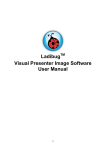
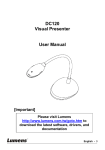
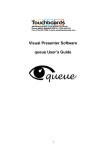
![Document Camera User Manual - English [Important]](http://vs1.manualzilla.com/store/data/005869740_1-d5afbdd6fe5957e2a87c5d7dc0d0d3c3-150x150.png)
